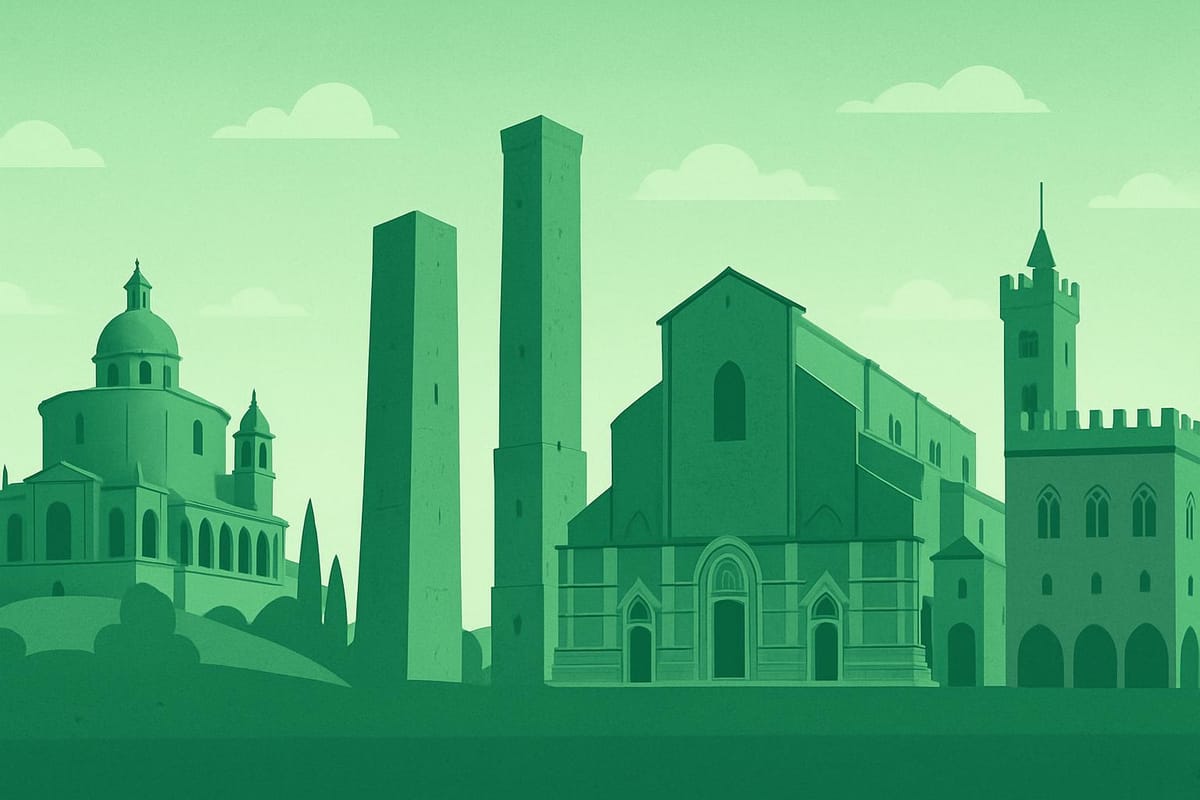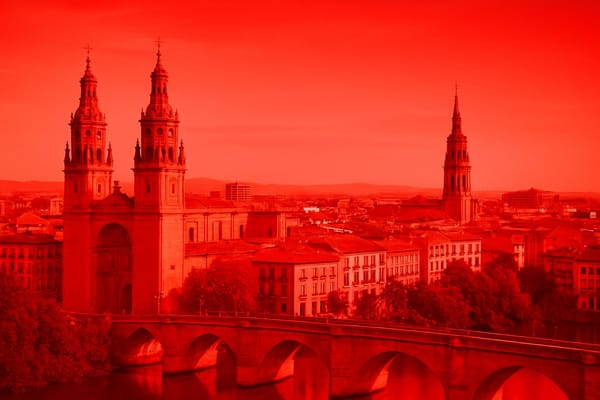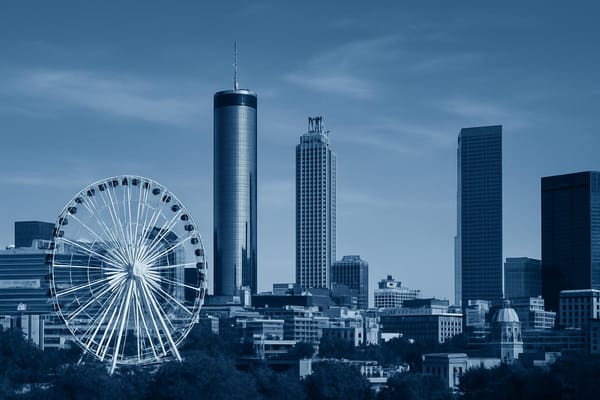Bologna
Top attractions: medieval towers, endless porticoes, world-famous pasta & vibrant food markets

Important things to know about Bologna
Bologna, Italy unfolds as a living tapestry of history, culture, and everyday Italian life, where red-tiled roofs and narrow streets frame a city that balances tradition with modern energy; known across Emilia-Romagna for its rich culinary heritage, the Bolognese identity permeates markets, cafés, and family kitchens, creating a sensory experience of aromas, flavors, and conviviality that defines the local way of living. As a dynamic university city, Bologna pulses with a youthful, intellectual atmosphere that fuels arts, innovation, and a lively nightlife, while remaining deeply rooted in artisan craftsmanship, local food production, and seasonal markets; the city’s urban fabric reflects centuries of layered history in textured façades, intimate courtyards, and uniquely sheltered walkways that invite slow exploration and social conversation. Residents and visitors alike appreciate the strong sense of community and sustainability initiatives that support cycling, public transport, and neighborhood commerce, making Bologna not only a cultural hub but also a practical, livable place for families, students, and professionals. Gastronomy, language, and festivals weave together to form a recognizable Bolognese spirit that celebrates conviviality and culinary excellence without pretense, and the city’s strategic location in northern Italy connects local tradition to wider regional networks in food, academia, and industry. Whether experienced through its everyday rhythms, seasonal markets, or the warmth of local hospitality, Bologna offers an authentic, richly textured portrait of Italian urban life that continues to inspire and evolve.
Sightseeing hot-spots in Bologna
Bologna is a captivating city in Italy that rewards every visitor interested in rich history, architecture and food. The heart of the city is Piazza Maggiore, a broad medieval square framed by impressive buildings like the Basilica of San Petronio and the ornate Fontana del Nettuno. Dominating the skyline are the famous Two Towers, Asinelli and Garisenda, whose lean and height recall Bologna’s medieval past and invite curious travelers to climb for sweeping city views. Wandering the porticoes-miles of colonnaded walkways that give Bologna a unique rhythm-feels like stepping through history, and they are part of what makes sightseeing in Bologna so atmospheric.
Cultural highlights are abundant and easy to combine into a day of discovery. The Archiginnasio and the University of Bologna, one of the oldest universities in the world, house the celebrated Teatro Anatomico and rich archives that illustrate centuries of learning. Nearby, the lively Quadrilatero market threads through narrow streets offering fresh produce, cured meats and local specialties-perfect for sampling true Bolognese cuisine. Don’t miss tasting classic dishes such as tagliatelle al ragù and tortellini in brodo while enjoying the convivial café culture. Museums, churches and intimate squares provide endless photo opportunities and insights into the city’s layered identity.
For practical sightseeing in Bologna, set aside time to climb the Asinelli tower at sunrise or sunset for unforgettable panoramas, then stroll the quieter lanes around Santo Stefano to discover hidden churches and peaceful courtyards. The compact center makes walking the best way to experience local life, and the long porticoes offer shelter in any season. Whether you’re planning a weekend escape or a longer trip through Emilia-Romagna, the blend of medieval architecture, vibrant markets and outstanding food culture makes Bologna an essential stop on any Italy itinerary.
Hotels to enjoy in Bologna
Bologna offers a wide range of hotels in Bologna to suit every traveler’s taste, from charming boutique properties tucked under the famous porticoes to modern business hotels near the train station. Staying in the city center means you can easily explore historic sites like Piazza Maggiore, the Two Towers and the vibrant food markets that have earned Bologna the title of a culinary capital. For visitors who prefer convenience, many Bologna hotels are within walking distance of Bologna Centrale, making them ideal for short stays or arrivals by train, while those seeking a more tranquil experience can find peaceful accommodations in quieter neighborhoods that still offer quick access to the old town. The local hotel scene blends historic charm with contemporary comforts, providing options for luxury, budget, and family-friendly travel.
When choosing among hotels in Bologna, consider what matters most-whether it’s proximity to dining and nightlife, on-site amenities, or rooms with views over red-tiled rooftops. Travelers focused on gastronomy will appreciate hotels that connect to local food experiences and cooking classes, while business travelers often prioritize reliable Wi-Fi and meeting facilities in centrally located Bologna hotels. No matter your preferences, you’ll find properties that emphasize courteous service, authentic local character and easy access to public transport, making it simple to discover the city’s art, music and gastronomic treasures. With a variety of accommodation styles to match every budget and travel style, the right hotel can turn a Bologna visit into an unforgettable Italian experience.
Restaurants to try in Bologna
Bologna's culinary scene is a treasure for anyone searching for restaurants in Bologna that combine history and taste. From humble trattoria counters to refined, Michelin-starred rooms, the city offers a spectrum of dining experiences rooted in Bolognese cuisine. Wander the narrow lanes of the Quadrilatero market and you’ll encounter hand-rolled tortellini, fresh pasta like tagliatelle al ragù, cured meats, and wheels of Parmigiano-Reggiano displayed alongside cellars of Emilia-Romagna wine. Many Bologna restaurants pride themselves on slow-cooked, family recipes handed down through generations, while others reinterpret tradition with seasonal, farm-to-table ingredients. Whether you crave a casual bite after a museum visit or an elegant tasting menu, the city’s mix of student energy and refined gastronomy ensures something memorable around every corner.
Beyond classic dishes, Bologna's dining culture is alive with innovation and conviviality: cozy osterie where locals linger over plates and aperitivo, contemporary kitchens experimenting with flavour, and intimate spots offering cooking classes to learn the secrets of fresh pasta. Service in the city often feels personal and unhurried, adding to the pleasure of sampling local specialties and regional wines like Lambrusco. SEO-savvy travelers searching for the best restaurants Bologna has to offer will find a robust scene that rewards exploration, from morning markets to late-night supper, showcasing why Bologna remains a top destination for lovers of authentic Italian food and culinary tradition.
Best shopping stops in Bologna
Bologna is a shopper’s delight, where fashion boutiques, historic arcades and independent artisans sit side by side. Strolling from Via dell'Indipendenza toward the heart of the city you’ll find an irresistible mix of high-street brands and exclusive Italian designers, while the elegant Galleria Cavour offers luxury labels and chic window displays. The medieval lanes of the Quadrilatero buzz with specialty shops selling handmade leather goods, ceramics and one-of-a-kind accessories, making it easy to combine sightseeing with shopping in a compact, walkable area. For those seeking vintage finds or contemporary design, small concept stores and atelier showrooms reveal emerging local talent, and friendly shopkeepers are happy to explain the craftsmanship behind each piece, which is ideal for travelers who want authentic Made in Italy souvenirs.
Food lovers will discover that shopping in Bologna goes far beyond fashion, with vibrant food markets and artisanal delis showcasing the region’s famous culinary treasures. From wheels of aged cheese and cured meats to jars of traditional preserves, these markets are both a sensory experience and a chance to purchase genuine Emilia-Romagna products to take home. Cafés, enotecas and specialty grocers complement the scene, offering tastings of local wines, olive oils and seasonal produce. Whether you’re hunting for handcrafted souvenirs, designer clothing or gourmet ingredients, Bologna’s combination of historic charm and contemporary retail makes it a top destination for memorable shopping experiences that reflect the city’s rich culture and culinary heritage.
Nightlife highlights in Bologna
Bologna's evenings pulse with a mix of medieval charm and contemporary energy, making Bologna nightlife a must-experience for visitors and locals alike. In the historic city center the streets fill with people enjoying aperitivo along the porticoes, while the Quadrilatero market district transforms into a lively hub of bars and wine spots where the aroma of local cuisine blends with conversation. The presence of the university ensures a vibrant student scene, where cheap drinks, friendly crowds and late-night hangouts create an animated, welcoming atmosphere. From cozy enotecas to trendy lounges, the city's nightlife balances tradition and modernity, offering something for every taste.
After dark, Bologna offers dynamic options for live music and energetic clubs, with venues ranging from intimate jazz bars to larger dance floors where DJs keep the beat until the early hours. Food-focused night owls will appreciate the abundance of late-night eats, from quick bites of traditional tagliatelle to artisanal pizzas and street-food stalls. Cocktail bars craft inventive menus and attentive service, emphasizing craft cocktails and local ingredients. Whether you’re seeking a relaxed wine bar in Santo Stefano, a bustling piazza for people-watching, or a music venue that showcases regional talent, the nightlife in Bologna promises memorable evenings wrapped in Emilia-Romagna’s warm hospitality.
Getting around in Bologna
Bologna is well served both by air and rail, with Bologna Guglielmo Marconi Airport (BLQ) located just a few kilometres from the historic centre and linked to the city by the modern Marconi Express people mover (a quick ride of around seven minutes), frequent airport shuttle buses and taxis, as well as car rental options; once at Bologna Centrale, the city's main train station, travellers find a major hub on Italy’s north-south corridor offering numerous high-speed trains such as Frecciarossa and Italo, reliable regional services and direct connections to Florence, Milan, Venice, Rome and beyond, making transfers smooth for both business and leisure trips, while the presence of night trains and regional lines ensures easy access to nearby cities like Modena, Parma and Rimini; for visitors planning logistics, the combination of a compact airport, fast people-mover or shuttle links, plentiful taxis and the wide range of national and regional rail options creates an efficient Bologna transport network that optimises time between airport to city center and beyond, improving overall travel experience and connectivity for domestic and international journeys.
Culture must-see's in Bologna
Bologna, Italy, stands out as a vibrant hub of historic architecture, academic life and creative energy. The city’s medieval heart is defined by soaring towers, expansive squares and one of its most distinctive features: the Porticoes, a UNESCO-recognized network of covered walkways that weave through the historic center and connect landmarks like Piazza Maggiore and the imposing Basilica di San Petronio. Home to the University of Bologna, founded in 1088 and often celebrated as the oldest university in continuous operation, the city blends scholarly tradition with contemporary arts - from the collections of the Pinacoteca Nazionale to the cutting-edge exhibitions at MAMbo. Music lovers gravitate to the Teatro Comunale and small venues that sustain a lively concert scene, while public festivals and open-air performances animate the streets year-round, making Bologna an essential stop for travelers seeking cultural depth in Italy.
The soul of Bologna is equally defined by its culinary reputation: the Bolognese cuisine is renowned worldwide, with signature dishes like tagliatelle al ragù, delicate tortellini and the famous Mortadella anchoring a rich food culture found in bustling markets such as the Quadrilatero. Local markets, artisan workshops and contemporary design studios create a layered cultural landscape where tradition and innovation coexist, reflecting why locals affectionately call the city La Dotta, La Grassa, La Rossa. Events like Arte Fiera and the Salone del Libro reinforce Bologna’s status as a cultural capital, while cozy osterie, lively cafés and student-driven nightlife ensure that every visit is immersive, flavorful and distinctly Bolognese.
History of Bologna
Bologna's story stretches from ancient roots to a vibrant modern city, and the history of Bologna is woven into every street and monument. Originally settled by the Etruscans and later Romanized as Bononia, the city developed as a strategic crossroads in northern Italy, flourishing through trade and agriculture. In the Middle Ages Bologna emerged as a powerful medieval commune, governed by guilds and magistrates, and became a beacon of learning with the founding of the University of Bologna in 1088, widely regarded as the oldest continuously operating university in the world. The university attracted scholars from across Europe, shaping the development of civil and canon law, medicine and the humanities, and helping to establish Bologna’s reputation as an intellectual capital. Architectural landmarks like the leaning Two Towers, the expanse of Piazza Maggiore, and the endless arcades of porticoes reflect centuries of civic pride and urban growth; these features not only define the cityscape but also symbolize rhythms of daily life, from marketplaces to scholarly debates. Through medieval rivalries, communal autonomy and periods of external domination, Bologna maintained a distinctive identity, preserving its artistic traditions, public spaces and early institutions of higher learning.
The subsequent eras added layers to the history of Bologna: Renaissance art and architecture left elegant palazzi and churches, while the city’s inclusion in the Papacy-dominated Papal States shaped political and social structures until the 19th century. Bologna played an active role in the Risorgimento, contributing to the movement for Italian unification and later evolving through industrialization into a center for manufacturing, publishing and innovation in the Emilia-Romagna region. Twentieth-century upheavals, including resistance during World War II and postwar reconstruction, deepened a civic culture known for engaged politics and robust public life. Today Bologna balances historical preservation with contemporary vitality: the University of Bologna remains a major force in research and student culture, culinary traditions like ragù alla bolognese and fresh pasta sustain its global gastronomic fame, and cultural institutions, festivals and creative industries attract visitors and scholars alike. The city’s layered past-visible in its porticoes, towers and squares-continues to inform its present, making Bologna an enduring subject of historical study and a living, dynamic destination in northern Italy.



